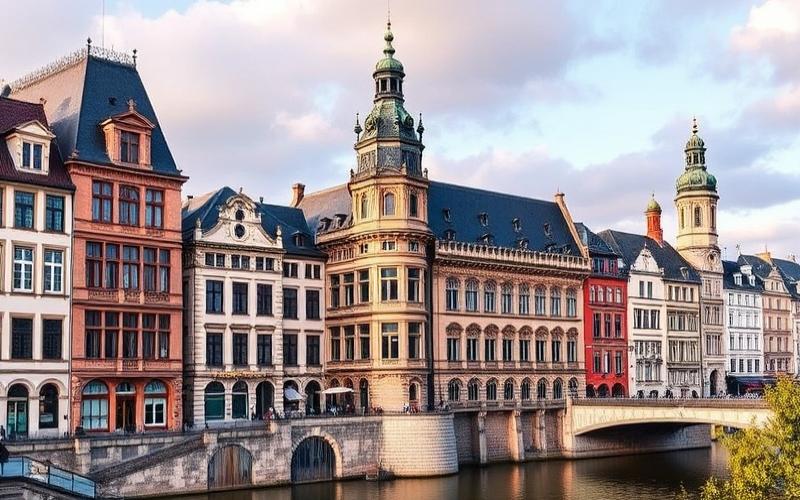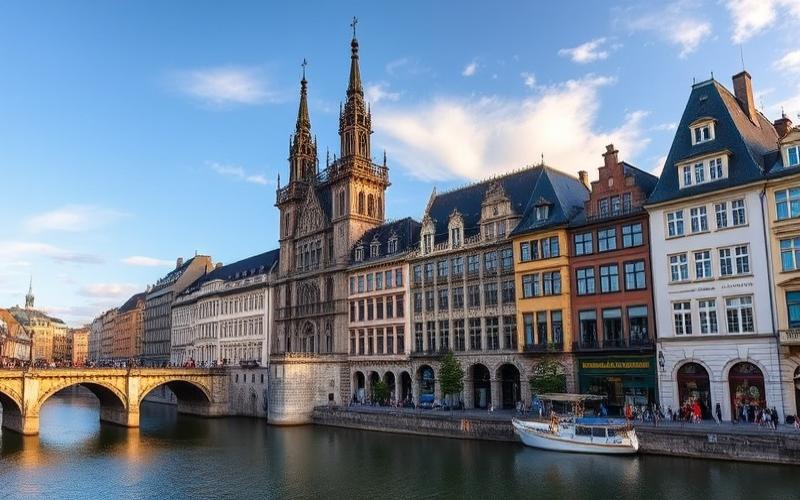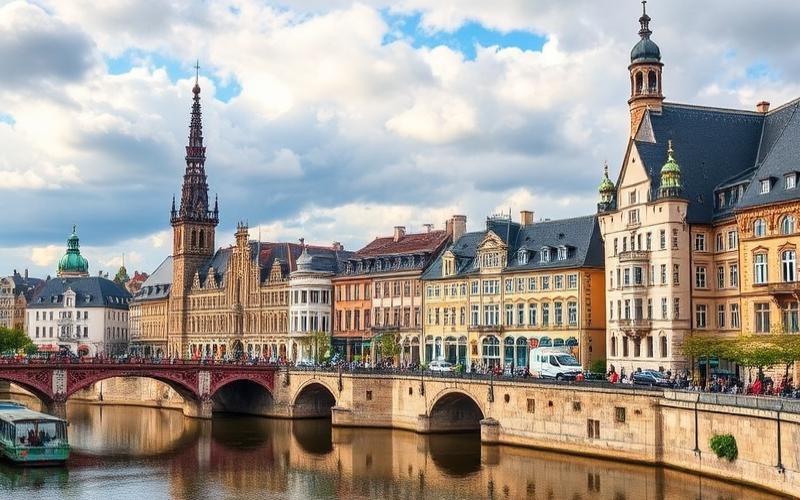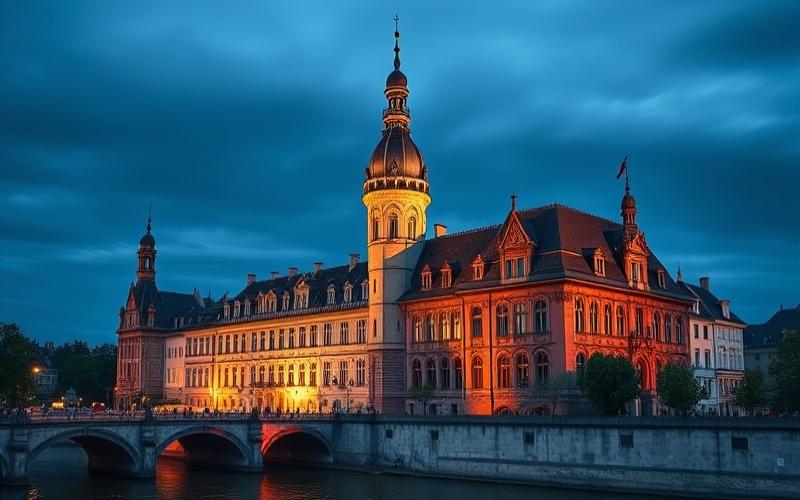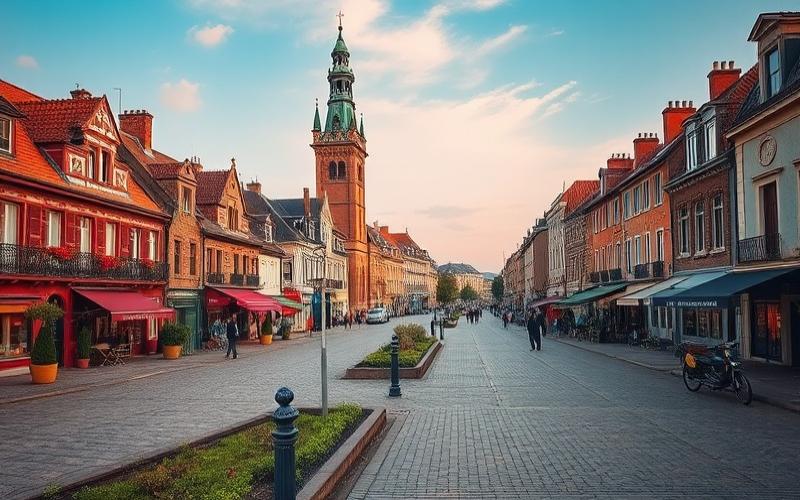
 Published on and written by Cyril Jarnias
Published on and written by Cyril Jarnias
In Luxembourg, a country where real estate prices reach dizzying heights, a new trend is emerging to meet residents’ needs: “co-living spaces”. These shared living spaces, combining functionality and friendliness, are increasingly attracting young professionals seeking affordable and flexible housing while wanting to maintain an active social life. By offering an environment where one can live, work, and build connections simultaneously, co-living is establishing itself as an innovative and attractive solution within a transforming Luxembourg real estate market.
Upscale Co-living in Luxembourg: A Growing Trend Among Young People
Upscale co-living in Luxembourg is emerging as a major trend among young people, primarily driven by soaring real estate prices and a profound shift in lifestyles.
Why is Upscale Co-living Appealing to Young People in Luxembourg?
- Prohibitive Real Estate Prices: The average rent for a studio in the city center reaches €1,600 per month, making individual housing access difficult for young professionals and students.
- Flexibility and Adaptation: Co-living offers offer flexible leases (often from one month to one year) and great flexibility, meeting the needs of a generation of young professionals and digital nomads seeking mobility and simplicity.
- Community and Sharing: Upscale co-living is no longer limited to simply sharing an apartment but fosters a true community experience, valuing diversity, mutual aid, and personal development.
Characteristics of Upscale Co-living
| Characteristic | Description |
|---|---|
| Designer Common Spaces | Spacious living rooms, equipped kitchens, gardens, terraces, cinema rooms, coworking spaces |
| Included Premium Services | Cleaning, high-speed wifi, laundry, subscriptions to streaming platforms |
| Quality Private Spaces | Rooms with private bathrooms and kitchenettes, modern and ergonomic furniture |
| Community | Selection of residents with shared interests, regular events, professional and social network |
| Contract Flexibility | Short leases, simplified administrative procedures, all-inclusive rent |
Benefits of Upscale Co-living
- Reduced individual costs through sharing expenses for superior quality services
- Access to well-located housing, often in city centers or near business districts (Kirchberg, Gare)
- Enriched social life through cultural and professional diversity of co-residents
- Reduced logistical constraints (furnishing, administrative procedures, cleaning management)
Examples of Popular Companies and Recent Projects
- Cohabs: Offers premium shared houses for 12 to 30 members, with gardens, cinema rooms, and an international community.
- The Collective: Provides co-living spaces with included services, event spaces, and contemporary design.
- Cocoonut: A new local offering focused on quality living spaces and friendliness, with testimonials from satisfied young professionals.
- WeWork (Living): Combines coworking and co-living for a complete experience, particularly sought after by young entrepreneurs and freelancers.
Statistics and Case Studies
- 70% of young professionals surveyed in Luxembourg state that housing costs are the primary barrier to residential independence.
- Upscale co-living spaces show nearly 100% occupancy rates in central and dynamic neighborhoods.
- Nearly one-third of new international arrivals prefer co-living for its network and integration facilities.
Cultural and Economic Evolution
- This trend reflects a shift in mindset: individual ownership is giving way to shared use, collective comfort is prioritized over isolation.
- Young people value flexibility, experience, and connection building, aligning with a more mobile and international job market.
- Co-living fits into a sustainable logic: resource pooling, reduced ecological footprint, optimization of urban spaces.
Upscale co-living in Luxembourg is therefore not just a response to the housing crisis: it reflects a new life philosophy, centered on sharing, flexibility, and the pursuit of quality of life in a demanding urban context.
Good to Know:
Faced with ever-rising real estate prices, young people in Luxembourg are increasingly turning to upscale co-living, an option that combines reduced costs and exceptional living environments. These co-living spaces often integrate premium services, such as gyms, designer shared kitchens, and common lounges, enabling an enriching community life. Recent projects like The Stay in Luxembourg City stand out for their modernity and friendly atmosphere, attracting a community of residents with shared passions. According to a study by the Housing Observatory, 70% of young workers consider co-living an ideal solution to the housing crisis. This trend reflects a cultural shift towards a more flexible and cooperative lifestyle, offering an attractive living environment while addressing the country’s economic realities.
The cost of living in Luxembourg is among the highest in Europe, particularly regarding housing. Real estate prices often exceed €10,000/m² in some central neighborhoods, making access to individual housing difficult for many, especially young professionals and newcomers. Shared spaces, such as co-living or collaborative co-housing, provide a concrete response to this economic challenge:
- Cost Reduction: Sharing rent and utilities (energy, internet, cleaning) allows access to quality housing without bearing all fixed costs alone.
- Service Pooling: Many services (common area cleaning, digital subscriptions) are included and distributed among residents.
| Problem | Solution via Shared Spaces |
|---|---|
| High Price per m² | Shared Rent |
| Significant Utilities | Cost Pooling |
| Limited Access to Services | Services Included in the Offer |
Social Aspects and Community Building
Shared spaces promote the creation of dynamic communities where everyone can integrate quickly:
- Facilitated meetings upon arrival
- Significant reduction in feelings of isolation through daily exchanges
- Common spaces specifically designed to encourage friendliness
Real-life Example:
“When I arrived in Luxembourg from India to work at Amazon, I chose a co-living space. This not only helped me save on my budget but also allowed me to find my bearings quickly thanks to other residents with whom I discovered the city.”
Positive Impact on Sustainability
The inherent pooling in the shared model fully aligns with national ecological goals:
- Fewer redundant appliances (a common laundry room instead of multiple individual machines)
- Energy optimization (heating/lighting adapted for collective use)
- Better land use with intelligent densification
This housing model thus limits waste while significantly reducing the ecological footprint per inhabitant.
“Shared living spaces offer an eco-friendly solution… allowing for reduced energy consumption and waste while promoting a collective lifestyle.”
Growing Adoption Illustrated by Local Studies
Recent studies show a strong increase in the use of collective housing or co-living in Luxembourg:
- An official note on rental typologies notes that these concepts specifically target “young professionals” with the main objectives of “creating social interaction” and “compensating for limited private space with more collective amenities.”
- Local operators report that a non-European majority arrives each year and primarily seeks “to quickly find social connection” through these structures.
“Since moving into a co-living residence in Esch-sur-Alzette, I’ve been able to enjoy not only an affordable setting but especially a warm one, where mutual aid is part of daily life.”
— Testimony collected from a young Luxembourg resident
In summary:
Shared spaces allow residents of the Grand Duchy not only to ease their budget, to quickly build social ties, but also to live more sustainably, thereby simultaneously addressing three major contemporary challenges in Luxembourg.
Good to Know:
Co-living spaces in Luxembourg offer an economical solution to the high cost of living, allowing residents to share accommodation costs while accessing modern infrastructure. They foster the creation of dynamic communities, essential for combating loneliness, by establishing social bonds among inhabitants. By pooling resources and spaces, these housing options encourage a more sustainable lifestyle, aligning with ecological initiatives supported by the Luxembourg government. Recent local studies indicate that these spaces are increasingly appealing to young professionals and expatriates, attracted by the opportunity to settle in a collaborative and supportive atmosphere. A testimony from a resident of Esch-sur-Alzette highlights the ease of integration into the community and the positive impact on personal well-being.
Creating a Digital Community Through Co-living
Common spaces in co-living play a central role in fostering social interactions and strengthening the sense of belonging to a community. Their design aims to encourage meetings, exchanges, and collaboration among residents, while reducing social isolation. Examples include shared kitchens, friendly lounges, coworking spaces, and outdoor areas arranged for group activities. These shared places stimulate mutual aid, resource sharing, and creativity, while improving everyone’s quality of life.
Main Benefits of Common Spaces:
- Reduction of social isolation, by offering constant opportunities for meetings and discussions.
- Development of mutual aid and sharing, whether for professional advice, tool exchanges, or daily support.
- Stimulation of creativity through profile diversity and collaboration on common projects.
- Strengthening of the sense of belonging through collective rituals and the creation of lasting bonds.
Example of Space Distribution and Their Functions:
| Common Space | Main Function | Effects on Community |
|---|---|---|
| Shared Kitchen | Prepare and share meals | Friendliness, informal exchanges |
| Lounge/Coworking | Work, exchange, relaxation | Collaboration, creativity |
| Multipurpose Room | Workshops, events, group activities | Learning, personal development |
| Outdoor Space | Barbecues, gardening, relaxation | Group activities, well-being |
Digital platforms and integrated social networks have become essential for managing community life. They facilitate communication among residents, event organization, sharing of practical information, and coordination of pooled resources. Private groups on social networks, dedicated co-living management applications, and discussion chats allow announcing activities (workshops, dinners, outings), sharing ideas, or quickly asking for help.
Commonly Used Digital Tools:
- WhatsApp/Telegram groups for quick communication.
- Community management applications (e.g., Slack, Discord) for organizing common tasks and events.
- Internal platforms for reserving spaces or managing shared resources.
Examples of Successful Practices in Luxembourg:
- Regular organization of community dinners where each resident contributes to preparation or animation, strengthening the sense of collaboration.
- Establishment of shared object libraries (tools, devices, books) managed via a digital platform, promoting the circular economy and responsible sharing.
- Personal and professional development workshops led by residents themselves or external speakers, promoted and coordinated via digital tools.
- Coworking spaces open to local entrepreneurs, creating synergies and new opportunities for all inhabitants.
Potential Challenges of Managing Digital Communities and Solutions:
Information Overload:
Risk of message multiplication, making it difficult to follow exchanges.
Solution: Use of thematic channels, active moderation, regular summaries of important information.
Conflicts or Tensions Between Residents:
Misunderstandings can amplify in digital exchanges.
Solution: Implementation of a communication charter, recourse to internal mediators, organization of physical meetings to defuse tensions.
Uneven Engagement:
Some residents may feel excluded or less involved.
Solution: Encourage participation by diversifying event formats (in-person and online), create rotating roles for activity organization.
Privacy Respect:
Risk of intrusion or excessive sharing of personal information.
Solution: Limit data collection, raise awareness of good digital practices, guarantee transparency on platform usage.
Important Text:
Common spaces and digital tools, when well-designed and managed, transform co-living into a true supportive community, where everyone finds their place and can thrive in a harmonious, collaborative, and innovative environment.
Good to Know:
Common spaces play a crucial role in co-living spaces in Luxembourg, fostering exchanges among residents and strengthening the sense of belonging. Thanks to the integration of digital platforms and social networks, residents can communicate easily and organize collective events, such as themed dinners or creative workshops. For example, some co-living spaces in Luxembourg have implemented applications enabling resource sharing, like tools or skills, thereby boosting collaboration. However, managing a digital community can present challenges, particularly in terms of moderation and security. To overcome these obstacles, it is essential to establish clear rules and a feedback system to ensure a harmonious and welcoming space.
Disclaimer: The information provided on this website is for informational purposes only and does not constitute financial, legal, or professional advice. We encourage you to consult qualified experts before making any investment, real estate, or expatriation decisions. Although we strive to maintain up-to-date and accurate information, we do not guarantee the completeness, accuracy, or timeliness of the proposed content. As investment and expatriation involve risks, we disclaim any liability for potential losses or damages arising from the use of this site. Your use of this site confirms your acceptance of these terms and your understanding of the associated risks.










